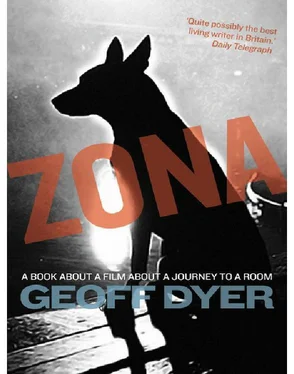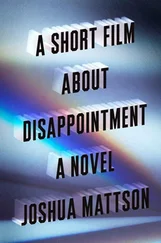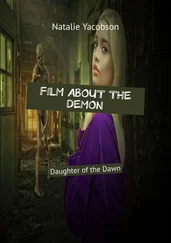If Stalker had not been the first Tarkovsky film I saw I might have recognized elements of this landscape from Mirror —the cross T’s of the telegraph poles, the greens (made more lush, somehow, by being subdued), the distinction between the man-made and the natural being eroded before our eyes. If I had seen Mirror I might have recognized this landscape, these elements, as Tarkovskyland, might have echoed the first words uttered by Stalker: Here we are. Home at last.
And yet, at some level, I must have recognized or at least been familiar with a modest and local variant of this kind of landscape — which perhaps accounts, in part, for why the film has made such a deep impression on me.
There is just one train station now in Cheltenham, where I grew up, but in the late 1950s and early 1960s there were four. One of these, Leckhampton, was only a five-minute walk from where we lived. My father used to take me up there when I was a toddler to watch trains steam in and out. The line and the station closed down in 1962, when I was four. I have no recollection of going there with my dad (only of his telling me that we used to go there) but I have strong memories of heading off to this abandoned, brambly zone to play with a couple of friends, when we were eight or nine. The windows of the disused station building had been smashed and the rain had seeped in; it looked as if it had long ago fallen into decay. (It may have only been three of four years previously that the station closed down but this, to me, was half a lifetime ago.) Faded, rain-buckled, the timetable was still displayed — a memorial to its own passing. An empty packet of Player’s cigarettes, the ones my mother smoked, with the face of the bearded sailor on the front, gone to a watery grave at the bottom of a puddle: frog-spawny, rust-coloured, pond-size, cloudy with gnats. The tracks had rusted, were overgrown with weeds, grass, stinging nettles, dandelions. Sometimes we followed them for a while, beyond the ends of the platforms, but never as far as the next station along the line — also abandoned — a couple of miles away, in Charlton Kings.
Here we are, says Stalker. Home at last.
THE ZONE PARTS of Stalker were filmed in or near two abandoned hydroelectric power plants — one of which had been partially blown up when the retreating Red Army was trading space for time in 1941—on the Jägala River, about fifteen miles from Tallinn, the capital of Estonia. This was not Tarkovsky’s first choice for the Zone. He initially intended to film around an old Chinese mine in the Tian Shan foothills near Isfara in Tajikistan. Apart from the single-line railroad track curving through it this earlier version of the Zone has almost nothing in common with the place in the actual film. It’s more like the badlands of Death Valley (where Antonioni got the name for and shot the final scenes of Zabriskie Point): devoid of vegetation, pale yellow and desert-dry, stark. 15Tarkovsky loved everything about the original location, but when an earthquake devastated the region before filming could begin, an alternative had to be found. As Rerberg put it, ‘The first stone thrown out of the wall of the script was the location.’ Footage exists of the original location: one can see how it might have served Tarkovsky’s purpose, though the film would have been quite different, would have lacked the damp, drippy, almost-ordinariness of the Zone in its final incarnation. Alien, unearthly (a word applied to a surprising number of places on earth), it lends itself perfectly to sci-fi but lacks the subtle magic of the more temperate Zone. As such it would have rendered that line of Stalker’s—‘Home at last’—rather odd. 16
Stalker utters this cosy sentiment after stretching his arms, as though he has been sleeping, like one awakened from the dream of life. But it’s not only him: the whole landscape seems to be emerging from sleep, rubbing the mist from its eyes, as if it has been stirred into consciousness by the fact of being seen, appreciated, visited, needed. We have only just arrived and already there is a sense, dormant and untapped, of slumbering sentience about the place. How quiet it is, says Stalker. The quietest place on earth. One sees what he means even though, strictly speaking, it’s not quiet at all. There are the sounds of birds, wind, flowing water, sounds that emphasize the lack of other sounds, the sounds that constitute noise, industrialization, cities, traffic, stress. As with the unquiet quiet, so with the solitude: Not a single soul here, says Stalker. What about us? asks Writer, logically enough. 17
Stalker is overwhelmed by his return to the Zone, struggling to compute and explain the way that it compares with his memories of earlier visits. The flowers don’t seem to smell. Partly because — this is Writer again — there’s a pervasive smell of damp bog. No, that’s the river, says Stalker quickly, like an estate agent assuaging the doubts of a potential buyer. But Writer has made his point: to him, the Zone looks like a bit of a dump. He doesn’t feel at all like he’s home. On the contrary: at this point, he understands exactly what Heidegger meant when he said that ‘the unhomely does not allow us to be at home.’ Writer, evidently, is in a bad way. He’s one of those people who could wake up in paradise but wouldn’t know he was there unless he found something to grumble about. There were flower beds here, Stalker says, but Porcupine trampled them down. (This is the first we’ve heard of Porcupine, a name which has vague asso-ciations with The Last of the Mohicans or something like that.) The smell lingered for years after the flowers were gone. 18
Why did Porcupine do that? Stalker says he doesn’t know but thinks that perhaps Porcupine came to hate the Zone. He’s sitting down, doing something while the other two are shuffling about, having a look around, not knowing what to do. Writer wants to know about Porcupine. He was the one who taught Stalker things, opened his eyes — opened his eyes the way Tarkovsky has opened our eyes. He wasn’t called Porcupine back then, he was called Teacher and he kept coming back to the Zone, bringing people here. Then something broke in him. Possibly it was a punishment of some kind.
Stalker asks Professor to help tie metal nuts (as in bolt) to some grubby white bandages while he goes for a walk. The wind moves through weeds and plants. The camera lingers on the wind moving through the weeds and plants, on the weeds and plants as the wind moves through them. Professor and Writer are a little uneasy now that they’re alone, but they take advantage of Stalker’s absence to indulge in that most unZonely of pleasures: talking about him behind his back. He’s different from what Writer thought he’d be. He was expecting something more like Chingachgook or Leatherstocking— from The Last of the Mohicans ! Classic Zone, that, the way that it either reflects what you have been thinking or somehow prompts you to think what it will soon reveal. I mean, where did I get the idea that Porcupine had some-thing to do with James Fenimore Cooper? From seeing the film many times before, presumably, but this muddling of cause and effect will recur again and again. So Writer was hoping for more of a pathfinder, more of a Daniel Day-Lewis bounding through the Mannly wilderness than this anxious, furrow-browed zek who, in fairness, has cheered up considerably since getting into the Zone. We’re learning a lot in quite a short space of time. Stalker was in prison. To be a Stalker is a calling but he has paid a heavy price for his calling. He has a daughter, a Zone victim. And what about Porcupine? Professor has done his homework: one time Porcupine returned from the Zone and got fabulously rich overnight. What’s wrong with that? Writer wants to know. (I sometimes think writers’ love of money is purer than that of hedgefund managers or bankers; only serious writers really appreciate the delicious, improbable perfection of getting paid .) A week later Porcupine hanged himself, Professor explains. Ah. The camera is sort of drifting back and forth, not going anywhere or doing anything much and nothing much is happening. The air is filled with a howl, the kind of howl the wind would make if a terrible gale were blowing (there isn’t a gale) and it (the wind) was the breath of an animal wounded by what it was hearing, by what was being said. 19
Читать дальше












